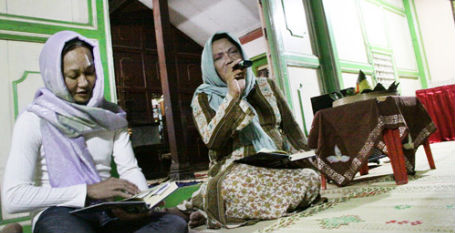The school, the first of its kind in the world’s most Muslim populated country, was closed when its founder Maryani died last month.
Know locally as Pesantren Waria, it was first set up for transgender women in 2008 when Maryani transformed her home into a place for transgender people to study Islam.
The school closed following her death and for want of a place till Shinta Ratri a lesbian, gay, bisexual and transgender activist, decided to reopen it by giving her Joglo-Javanese traditional style house that was built in the 1800s and had belonged to her grandmother, reports thejakartapost.com.
Shinta said the reopened school with 35 students offers subjects such as transgender and Islam, Qur’an reading and praying lessons.
“I hope the school can give students self confidence. Being transgender is not a sin. It is allowed in Islam as far as it’s genuine, not fake,” she told thejakartapost.com.
Wulan Agustina, a student at the school said she enrolled for religious studies ”which can strengthen our will to face the hardships of life.”
Wearing mukena (female prayer dress) and sarongs, the transgender women conducted the Friday evening prayer together at the April 18 reopening, reported thejakartapost.com.
“Everyone has the right to observe their religion in their own way,” said Faithful People Brotherhood Forum Yogyakarta Abdul Muhaimin advisory board member in his inauguration speech.
Muhaimin said Islam taught human beings were not allowed to undermine others, including transgender people, since all were created by God.
“According to the Qur’an, we are not allowed to classify people based on economic, social, political, gender or theological values,” said Muhaimin, who also leads an Islamic boarding school for girls in Yogyakarta, the Indonesian cultural capital.
Although transgender people were not specifically mentioned in the Qur’an, it had been discussed in Islamic legal philosophy, he said.
“I hope the students here are strong as they must face stigma in society. We have to care for them [transgender people],” he added.
Muhaimin lauded the reopening of Pesantren Waria.
Waria is a portmanteau of words for woman (wanita) and man (pria) and is often used to describe transgender women in Bahasa Indonesia, the national language spoken throughout the Indonesian archipelago.
“The reopening of the school has and brought the subject of freedom of religion for all — regardless of sexual orientation — back into the public arena,” reports thejakartapost.com.
The Jakarta Globe has reported elsewhere that Indonesians are strongly opposed to LGBT rights and that research found Indonesians were overwhelming opposed to same-sex relations, with 93 percent saying gay people should not be accepted.

